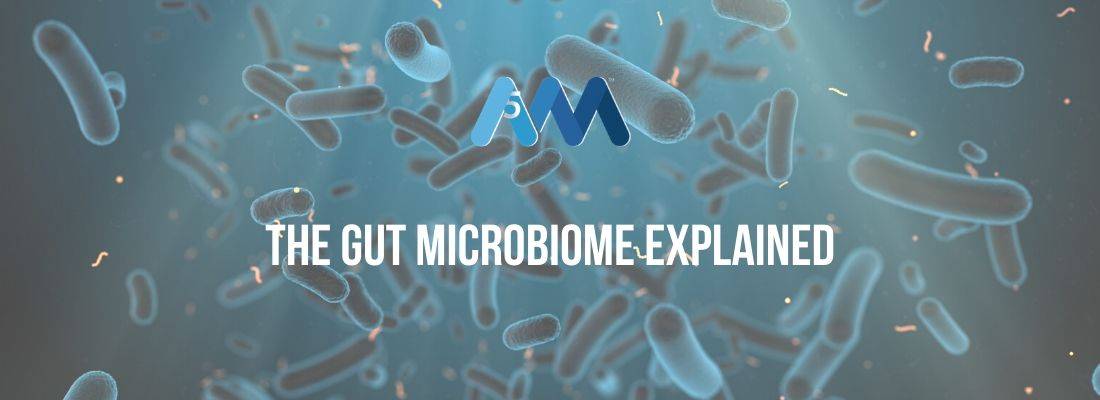By Dr. Aparna Hegde
Cosmetic & Integrative General Practitioner, Educator A5M & ACAAM, Advisory Panel Member A5M
MBBS, FRACGP, MPH & Tropical Medicine, Dip Aviation Med, ACAAM
It was not long ago that talking about gut health and microbiome (bacteria and fungal organisms) was once considered to be "out there" and a bunch of "woo". These days even specialities such as paediatrics, psychiatry and neurology are noting the importance of these organisms in their field.
A healthy population of the right microbiome in the gut equates to a happy and healthy you. So how do you ensure you have good gut health and promote the right bacteria? If possible, we can give baby the right start in life – a vaginal delivery optimises pick up of the beneficial bacteria from mum and if this is not possible "seeding" the baby with swabs from mum has now become common practice. Breast feeding and ensuring the baby's environment is not too sterile is best. The use of antibacterial wipes, hand washes, sanitising gels should be limited to where essential such as food preparation or in a health care facility. The use of mild soap and water washes should be promoted in the home.
Eating a Mediterranean style diet (lots of vegetables, fruit, smaller amounts of wholegrains, oily fish and limiting meat) of unprocessed food and organic where possible (at least minimise the dirty dozen) to limit intake of chemicals such as pesticides, regular intake of prebiotic foods is thought to be key for the healthy microbiome.
Probiotics are not necessary if the diet is good and while they have been shown to help promote the natural defences of the gut as they pass through, they don't play a part in colonising the gut.
Having fermented foods such as sauerkraut, kvass, kefir, kombucha and jun as part of the diet is thought to be as beneficial as taking a commercially produced preparation. Prebiotics such as the soluble fibre, inulin found in Jerusalem artichokes, chicory root and dandelion greens, resistant starches as in potato starch and plantains help keep your gut microbiome and in turn keep you in the best of health.
My advice is to limit the use of antibacterial products in the home as these have a detrimental effect on the gut microbiome. This includes limiting triclosan containing products such as toothpastes that have been shown to decrease beneficial akkermansia colonies even in small quantities.
We benefit from exposure to soil in many ways and we should let children get muddy and dirty during play. Adults should get into gardening for their soil exposure and not be too meticulous in washing off the produce prior to consumption. Pet owners have been shown to have more diversity in their gut microbiome and this has been attributed to contact with soil organisms that animals have on their fur.
Other practical steps to optimise the gut microbiome include having regular (at least daily) bowel movements, restricting eating periods to ensure a minimum of 12 hours of fasting and the use of digestive bitters prior to eating.
Antibiotics and illness such as gastroenteritis can have a detrimental effect on the gut microbiome, however if the measures outlined above are instituted, this is only short term and studies show restoration within days. One interesting theory that has emerged in the research in this field is that the appendix plays an important role as a reservoir of healthy bacteria when the microbiome has been affected.
Gut microbiome testing can be used clinically to aid in management such as in cases of suspected irritable bowel syndrome, dysbiosis or metabolic syndrome. I tend to use the smartDNA tests such as smartGUT microbiome test https://www.smartdna.com.au/smartgut-microbiome-test/ and IBS Detector test https://www.smartdna.com.au/ibs-gut-detector/ as they are offered by an Australian company, well validated for our population as well as being cost effective. You can organise this testing with your functional medicine practitioner.
Published by A5M with permission from the author
Dr Aparna Hegde can be found at Azure Medical in Perth, WA.
She is a UWA (1994) graduate who has specialised in General Practice and Aerospace Medicine. Aparna completed her certification in Anti-Ageing Medicine with A5M in 2017 (ACAAM). She has a special interest in Women's Health, she is experienced in the use of bio-identical hormones and supplements to restore normal physiology. Aparna was in the RAAF full time for 11 years and is still in the specialist reserves.
A5M Medical Education - Providing training, certification and continuing education in Preventative, Integrative & Anti-Ageing Medicine
www.a5m.net | +61 3 9853 4123 | ABN 79 763 657 407




